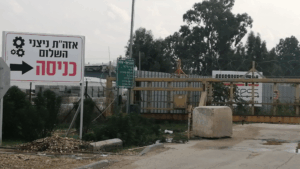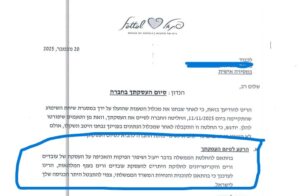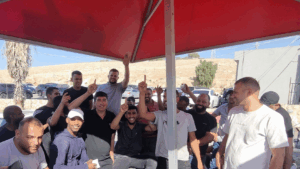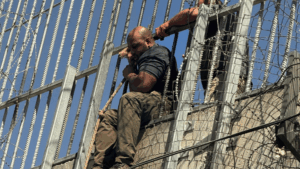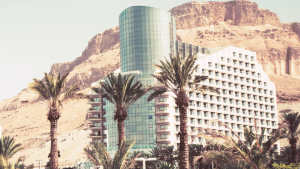When Yossi Aud, founder and director of the project, opened the event, he remarked:
“I want to light two candles — one for anyone in need of light, and one for the women of the Jahalin tribe, whose arrival was blocked by the Civil Administration.”
Yossi’s words, perhaps unintentionally, captured the difficult reality faced by peace-seekers in Israel. On one side stands a determined struggle to preserve humanity amid a bloody conflict; on the other, military obstacles that stifle any effort at cross-border solidarity.
But the leadership of “Bees for Peace” refused to accept this setback. If the women of Jahalin could not come to Tel Aviv, then we would go to Jahalin.
Journey to Khan al-Ahmar
In the sweltering heat of a July week, six women from the Triangle region — graduates of beekeeping courses supported by the MAAN and סינדיאנת הגליל סחר הוגן — set out to represent the project in a special encounter with the Jahalin women’s honey group in the village of Khan al-Ahmar. This unrecognized Bedouin village lies in Area C, meaning its residents fall outside the jurisdiction of the Palestinian Authority and do not hold Israeli identity cards.
We were greeted with warmth and deep emotion by 12 women who had gathered at the home of one of their members. A spokesperson from our delegation opened with greetings on behalf of the “Bees for Peace” project and all of Israel’s bee women’s groups, sharing an overview of our activities in the Triangle area. The Jahalin women expressed sincere joy at the visit and thanked us repeatedly.
They guided us on a tour of their new beehives, followed by a shared workshop where we learned to make nourishing cream using hive products. The session was led by Tal Landau, a natural healer specializing in apitherapy — healing through bee venom. We ended the day with a delicious meal prepared by our hosts.
A Glimpse into a Harsh Reality
Throughout the visit, the Jahalin women shared the stark realities of their daily lives and the immense challenges they face. What we witnessed was heartbreaking. We were struck by grief, frustration, and disbelief. How is it possible that in 2025, there are still communities living without electricity, water, or internet? It truly felt like stepping a century back in time.
Their homes are built from tin and cardboard. They are forbidden from adding even a single tin room — every attempt at construction is met with a demolition order. The greatest dream of many women we spoke with is for their children to have rooms of their own, where they can one day marry and raise families.
In addition, they endure persistent harassment from Jewish settlers — violence, intimidation, arson, and theft of their sheep herds, the community’s primary livelihood. Originally expelled from the Negev during the 1948 Nakba, the Jahalin settled in Khan al-Ahmar. Now, they face the threat of displacement once again. Many families have already been forced to sell their herds and relocate to other areas of the West Bank to survive.
Despite these dire circumstances, the women we met remain steadfast and determined to resist the existential threat looming over them.
Before parting ways, we exchanged wishes for success in our shared project and promised to meet again. The women of Jahalin expressed hope that they might soon visit us and asked to be included in future initiatives that could help improve their quality of life.
We left with heavy hearts — emotionally and mentally overwhelmed, yet deeply inspired by their resilience.





